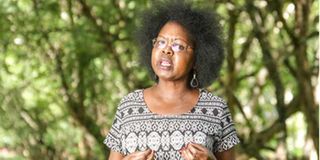Joyce Wanjiku: The CEO who became a beggar for the elderly

Joyce Wanjiku, the director of Purity Elderly Care Foundation, during an interview at Mweiga in Nyeri County on January 23, 2024.
What you need to know:
She led a flamboyant life, drove some of the world’s expensive cars and travelled the world frequently on work assignments but quit all that and returned home to serve less-fortunate senior citizens
Joyce Wanjiku Kairu was with her friends enjoying the 2010 Fifa Men’s World Cup match at Loftus Versfeld Stadium in Pretoria, South Africa, when a certain voice spoke to her mind: “Wanjiku, you can afford to travel all the way to South Africa to watch football at midnight, yet your mother was sick and you were never there for her?”
Her mother – Purity Wanjiru Kairu – had died on June 3 the same year of colon cancer and after the burial, Joyce returned to South Africa, where she worked as a project manager for a number of corporate financial institutions.
She led a flamboyant life, drove some of the world’s expensive cars and crisscrossed the world frequently on work assignments.
“After that voice spoke to me, I felt annoyed for some time. That is when it dawned on me that I needed to do something. But we went ahead watching the thrilling football match,” Joyce says, adding that she continued hosting friends in her house to watch the Fifa World Cup.
But the guilty conscience kept haunting her until in 2011 when she started pressuring her boss that she wanted to resign procedurally and that she was contemplating utilising the rest of her life serving the less privileged in society.
Joyce issued her employer a month’s resignation notice and started utilising that period by visiting Soweto, Alexandra and Riviera to help elderly people who seemed frail and lonely.
Read: Look out for the elderly
“The day I officially quit my job, packed my belongings in readiness to return to Kenya, my boss hosted me for dinner and told me that I was out of my mind.”
True to her word, Joyce jetted back to the country and embarked on a journey to her village in Mweiga, Nyeri County.
When she got home, her father, Herman Kairu who has since died, shared the same sentiments as her ex-boss: “You are running mad.”
Joyce narrates that her first challenging encounter in charity work was when she visited 94-year-old Rebecca Waithera*, who was ailing, in the same village.
“When I visited her house, she had maggots coming out of her wounds and was smelling bad. I sourced a clinician and several volunteers from the village.
"We jointly supported her, but, unfortunately, she died 16 days later,” she says.
“I felt so grateful and fulfilled because I overcame the challenge that God had exposed me to.
"Though she died, God knows that I had really tried my best to help that woman, who was sick and neglected by the community because she didn’t manage to bear children.”

Joyce Wanjiku, the director of Purity Elderly Care Foundation, chats with Mary Wairimu at Mweiga in Nyeri County on January 23, 2024.
That was the same year she resolved, out of conviction, to found and register Purity Elderly Care Foundation (PECF), a nongovernmental organisation, in honour of her late mother – Purity.
She is its chief executive officer.
Joyce says the main challenge faced by the elderly is loneliness and stigma majorly due to urbanisation and phone technology.
Some men who used to abuse wives or young children get stigmatised in society when they grow old, she adds.
“Maybe he or she lives in the city and decides to return to the village after they grow old. The person gets stigmatised because the community perceives that they were once rich but have returned to the village with nothing.”
Joyce calls for compassion and the need to champion the rights of the elderly persons, adding that the role should not be solely left to the government.
The search for better living conditions and economic opportunities in urban areas and the diaspora has left many African families split.
Elderly people, being a part of an important segment of society, find themselves neglected, abandoned, forgotten, stigmatised, abused, and even lonely.
“One day, I encountered Janet Muthoni* who had 10 children with her husband. They had marriage conflicts and the children ganged up against their father. They neglected their father and have only been looking after their mother. I had no option but to show compassion to the two parents. Those are some of the incidents we solve in the community.”
According to the 2019 Kenyan Population and Housing Census, Kenya has a population of 47.6 million. The elderly (65+) comprises over 1.3 million persons, a relatively substantial fraction.
Joyce is now a beggar, despite having worked for well-paying companies abroad and led a flamboyant life.
One can find her in the bustling streets of Nyeri town sourcing items for the elderly women she caters for. She walks from one premises to another seeking donations.
“One thing you need to know is that I am now a professional beggar. When I came from South Africa, I spent the money I had helping the elderly and forming an NGO.
"I literally beg for support for the elderly and most of the time you will find me walking in town scouting for donations," she says.
"I look for food and hampers like soap, matchboxes, blankets and other items from donors and well-wishers. I am proud of what I do.”
Jointly with her four-member staff, she has reached out to over 2,000 elderly persons in the Mt Kenya region. She has also renovated several dilapidated houses for them.
In 2014, she received the Humanitarian Award on International Women’s Day and in 2017, she scooped the Special Commendation Award on Ageing Service from the Global Aging Network in Switzerland.
In 2018, she received the Humanitarian Award on International Women’s Day and the Humanitarian Award on International Girl Child from Amani Foundation.
In 2021, she scooped the Recognition Award from the DIAR Awards and another Recognition Award from the National Gender and Equality Commission.
Read: The elderly deserve care
The foundation always looks forward to observing World Elder Abuse Awareness Day on June 15 and the United Nations International Day for Elder Persons on October 1. It organises a party for the elderly persons in Mweiga town, where its main offices are.
The foundation’s challenges include inadequate resources to run its operations given the rise in operational costs. It is also faced with limited staff incentives.
“Sometimes when we reach out to help the elderly, some family members are hostile and think we will expose them. We get insults and ridicule from families who do not understand our intentions in society.”
On June 3 every year, she holds a party for the elderly as a memorial in honour of her late mother. On May 28, 2010, Joyce had returned to the country from South Africa and celebrated her birthday on May 30. Her mother died three days later.
“I am happy because my wish of celebrating my birthday with my mum before she died indeed came true. We had a good time together. Now, I want to hold a party to commemorate 13 years since she left us. She must be proud of me there in heaven.”
Her message to the young generation is that they should take care of their parents before they get old to avoid rushing against time taking them to expensive hospitals when they are on the verge of death.
“To young people, please, celebrate and take care of your parents when they are still alive. Stop opening WhatsApp groups when your parents are dead, yet you have neglected them.
“Stop coming with your children to your parents’ burial, yet the same parents hadn’t seen them because you were so busy in town or abroad. Stop printing T-shirts ‘RIP Shosh or RIP Guka’, yet you didn’t have time for them when they were abandoned in the village,” Joyce says.
“Don’t rush your elderly parents to expensive hospitals after you have neglected them over the years. Take them for screening when they are still young. Ensure that they are healthy and well-loved.”
*Name changed to protect the identity of the domestic violence survivor.





